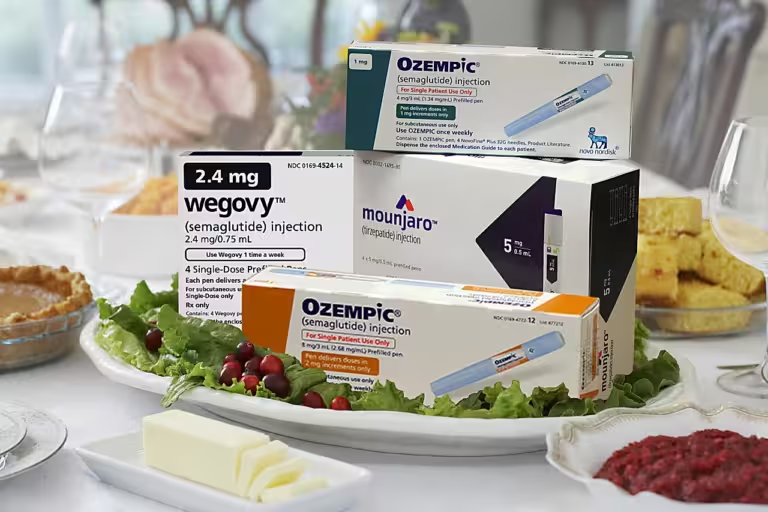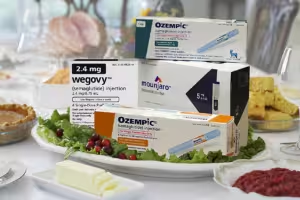
by Alice Benjamin, MSN, ACNS-BC, FNP-C
Thanksgiving is one of my favorite holidays. It’s a time to gather with family and friends, share stories, and create memories over a table full of delicious food. But as a family nurse practitioner working in the ER, I’ve seen how this indulgent holiday can go sideways for many people, especially those managing chronic conditions or using medications like semaglutide (Ozempic or Wegovy) or tirzepatide (Mounjaro or Zepound). My goal? To help keep you out of the ER so you can stay home, healthy, and happy with your loved ones.
If you’re taking these medications, Thanksgiving can be tricky. While they are powerful tools for weight loss and blood sugar control, they also slow digestion. Pair that with a holiday practically built around overeating, and you could end up with nausea, heartburn, or worse. But don’t worry—I’m here to guide you through how to enjoy your holiday without turning it into a GI disaster.
Why Thanksgiving Feasting Can Be Risky
Thanksgiving is synonymous with indulgence. The average American consumes between 3,000 and 4,500 calories in one sitting on Thanksgiving Day, often with meals heavy in fat, sugar, and salt. Turkey with gravy, creamy casseroles, sweet potato pie—everything is so tempting, and we often feel encouraged (or obligated) to pile on seconds.
For those on weight loss injectables the risk of GI distress is even greater. These medications slow how quickly food leaves your stomach, helping you feel full longer, but that also means food can sit in your stomach for extended periods. This increases the likelihood of nausea, bloating, indigestion, and even vomiting—none of which you want to experience during a family celebration. Add in the holiday’s typical high-fat dishes, alcohol, or overeating, and the digestive discomfort can go from mild to miserable fast.
How Do Ozempic and Mounjaro Work?
These medications belong to a class of drugs known as GLP-1 receptor agonists (Ozempic and Wegovy) or dual GIP/GLP-1 receptor agonists (Mounjaro and Zepound). They work by:
- Slowing Gastric Emptying: Food stays in your stomach longer, keeping you feeling full.
- Curbing Appetite: They send signals to your brain to reduce hunger, helping with portion control.
- Regulating Blood Sugar: They help your body use insulin more effectively, preventing spikes in blood sugar after meals.
While these effects are beneficial for weight loss and diabetes management, they can make large or heavy meals harder to handle. That’s why it’s important to approach Thanksgiving with a game plan.
Tips to Avoid Thanksgiving GI Distress
Here are some practical tips to help you navigate the Thanksgiving feast without the unpleasant side effects:
Pace Yourself
- Why It Matters: Eating too quickly doesn’t give your stomach time to signal your brain that it’s full, increasing the risk of overeating.
- Pro Tip: Take small bites, chew thoroughly, and set your fork down between bites. For example, savor each bite of turkey for at least 15 seconds.
Stick to Smaller Portions
- Why It Matters: Overloading your plate can overwhelm your stomach, especially with delayed gastric emptying.
- Pro Tip: Choose smaller servings of your favorite dishes. Instead of a heaping scoop of mashed potatoes, try a golf ball-sized portion.
Focus on Lighter Foods
- Why It Matters: Fatty or creamy dishes take longer to digest and can worsen nausea or bloating.
- Pro Tip: Load up on turkey (without skin) and roasted vegetables, and limit creamy casseroles, buttery rolls, and rich gravies.
Hydrate Throughout the Day
- Why It Matters: Staying hydrated aids digestion and prevents dehydration, which can worsen GI symptoms.
- Pro Tip: Sip water consistently throughout the meal. Avoid carbonated drinks, which can cause bloating, and limit sugary drinks or alcohol.
Skip the Seconds (or Thirds)
- Why It Matters: Adding more food to a slow-moving digestive system can lead to significant discomfort.
- Pro Tip: Enjoy one reasonable plate and remind yourself that leftovers are just as good the next day.
Limit Alcohol
- Why It Matters: Alcohol can irritate your stomach lining and worsen nausea or heartburn.
- Pro Tip: Stick to one small drink (if any) and sip it slowly, or opt for sparkling water with a splash of cranberry juice.
Tips to Prevent Heartburn
Heartburn is a common complaint during Thanksgiving, especially for those on medications that slow digestion. Here’s how to reduce the risk:
- Eat Smaller, More Frequent Meals: Spacing out smaller portions throughout the day can reduce pressure on your stomach.
- Avoid Trigger Foods: Stay away from acidic or spicy foods like tomato-based sauces, fried foods, and citrus desserts.
- Don’t Lie Down After Eating: Wait at least two to three hours before reclining to prevent acid reflux.
- Wear Loose Clothing: Tight-fitting clothing can put pressure on your stomach and worsen heartburn.
- Chew Gum After the Meal: Chewing gum can stimulate saliva production, which helps neutralize stomach acid.
What to Do If You Overdo It
Sometimes, despite your best efforts, you might overindulge. If that happens, here’s how to handle it:
- Stay Upright: Avoid lying down; instead, sit up or take a light walk to help digestion.
- Sip Water Slowly: Small sips of water can help ease nausea and support digestion. Avoid gulping large amounts, which can worsen symptoms.
- Try Ginger or Peppermint: These natural remedies can help soothe an upset stomach.
- Avoid Further Eating: Give your digestive system a break and wait for symptoms to subside before consuming anything else.
- Know When to Seek Help: If your symptoms are severe—persistent vomiting, extreme nausea, or chest pain—contact your healthcare provider or head to the ER.
Enjoy the Holiday Without the Heartburn
Thanksgiving is about so much more than food. It’s a time to connect with loved ones, express gratitude, and create memories. By approaching your meal mindfully, you can enjoy the best parts of the holiday while keeping your stomach happy.
My goal is to keep you home with your family and out of the ER this holiday season. With a little planning, you can have a Thanksgiving that’s healthy, satisfying, and filled with joy.
Happy Thanksgiving from Ask Nurse Alice!





